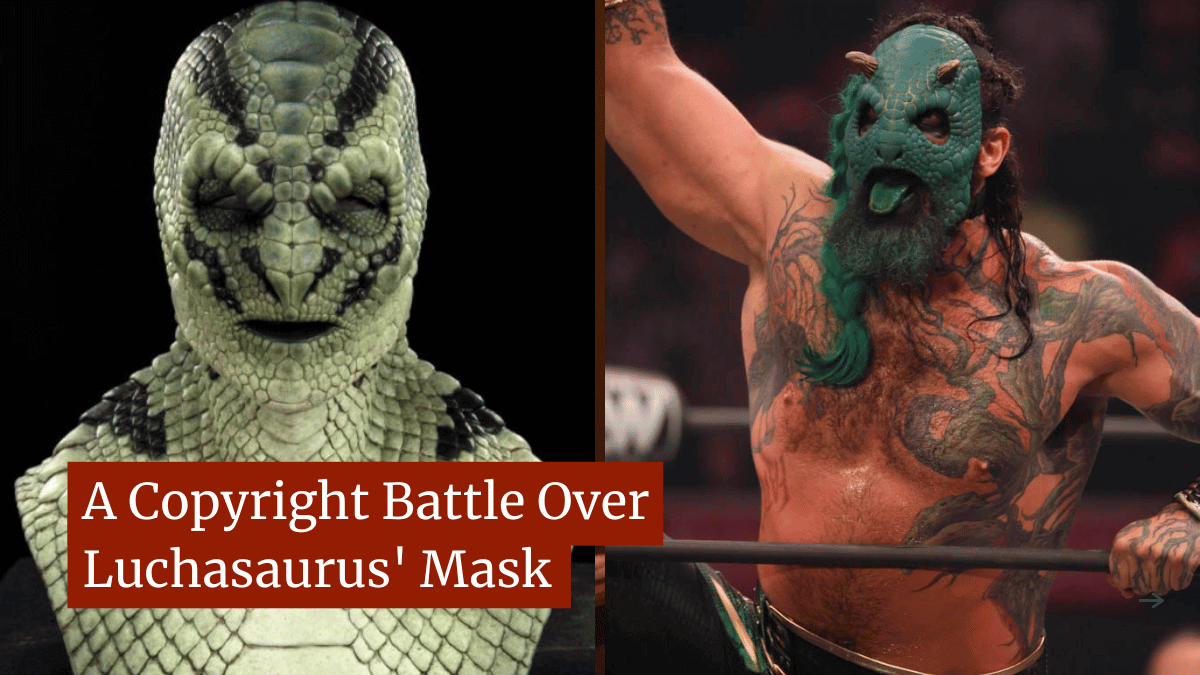Understanding the Luchasaurus/AEW Mask Lawsuit

News broke today that All Elite Wrestling (AEW) and one of their performers, Luchasaurus, are being sued by Composite Effects (CFX) over allegations that violated their copyright in Luchasaurus’ mask.
According to the lawsuit, CFX designed and created the dinosaur mask used by Luchasaurus when performing. However, while they agree that Luchasaurus had the right to use the mask while performing, they claim to still hold the merchandising rights to the mask, despite multiple attempts on their part to strike a deal with both AEW and Luchasaurus.
As such, they are suing for alleged copyright infringement. They are seeking profits that the two defendants have earned from the mask, as well as attorney fees.
According to CFX, they attempted to strike a deal with AEW in 2019 to no avail. They also created a new mask for Luchasaurus in 2021, one which AEW bought the rights to but used either rarely or never. They claim that Luchasaurus continues to use a mask based upon their design, which is still available for sale on their site.
The lawsuit could have significant implications for both professional wrestling and the mask-making industry, making it worthwhile to understand the case and what impacts it could have,
Understanding the Lawsuit

To start with, masks can be protected by copyright. They are essentially treated the same as any other two-dimensional or three-dimensional piece of artwork.
While there are limitations to that protection, one can’t copyright the human face nor can one protect the purely functional aspects of a mask, masks are considered creative work.
To that end, this isn’t the first lawsuit we’ve seen over a mask. In 2018 costume design company Easter Unlimited filed a lawsuit against Boston Celtics player Terry Rozier over his use of the “Scream” mask in a cartoon rendition of himself as “Scary Terry”.
That case was dismissed in 2021 as the court found Rozier’s use was a fair use of the mask.
More recently, in June 2022 artist Thomas E Wood filed a claim with the Copyright Claims Board against Spirit Halloween over a mask the chain sold in their stores. That case was settled out of court and voluntarily withdrawn.
Still, such cases are fairly rare. One of the reasons is that offering a mask for sale clearly conveys some rights to the purchaser, including the right to use it as a performer.
This is something that CFX acknowledges, both in their lawsuit and on their site. The company has a page outlining how purchasers can use their intellectual property, where they grant broad permission to use it in a “live event or experience” but not “monetizing the characters themselves.”
This brings us to the lawsuit, where CFX alleges that AEW used the mask in various merchandise without express permission from the company. This despite efforts from CFX to strike a deal and even creating a new mask that AEW acquired the needed rights to.
According to CFX, AEW chose to continue using the original mask, claiming that it was too iconic to change. Since no deal was struck between the parties, CFX is alleging it had no choice but to file a lawsuit, where they are seeking profits and attorneys’ fees.
That begs the question: What are CFX’s prospects in this case.
Analyzing the Case
At first glance, the two masks appear very different. Luchasaurus’ mask only covers the top portion of his face, while the CFX creation is a full head mask. Further, the two masks are different colors and Luchasaurus’ version has the addition of horns.
But, when you look closer and focus on the pattern of the scales, it quickly becomes clear that Luchasaurus’ mask is simply a repainted and cut down version of the CFX one.
However, there doesn’t appear to be much debate about that. According to CFX, they have worked closely with both Luchasaurus and AEW on not just this mask, but another version of it.
As such, the question isn’t whether the mask is CFX’s intellectual property, but whether AEW’s use of the mask is an infringement.
To that end, we can look at another recent case, one involving Take Two interactive and their use of tattoos on WWE wrestler Randy Orton. In that case, the jury found that the use of the tattoos in the WWE video games was an infringement but only awarded the tattoo artist $3,750 in damages.
That ruling was extremely controversial, in large part because it raised issues of bodily autonomy, since a tattoo is a permanent part of a person’s image. However, those issues don’t apply to this case as a mask can be removed, changed and altered easily.
With that in mind, the recent history in this space doesn’t look good for AEW. Since CFX has a license on their site and did license a different mask for merchandising to AEW, there’s not likely to be an argument about an implied license. Furthermore, if the use of five tattoos in a video game was not a fair use, the prominent use of the mask in various merchandise isn’t likely to be found one either.
Instead, much of the case may come down to how much of CFX’s work (in particular the version registered with the US Copyright Office) is in the version Luchasaurus is using and how it was used in the merchandise. However, this is very fact-specific and likely something that will be hashed out if the case moves forward.
That said, a settlement does seem very likely in this case. While we don’t know why AEW didn’t reach a merchandising deal with CFX, in particular after they did reach one on a different mask, doing so would almost certainly be the fastest and least expensive way to bring an end to this dispute.
Bottom Line
As a long-time wrestling fan and someone who is involved in the haunted attraction industry (which CFX is a major player in), this case brings together an unusually large number of elements of my life. To have the case heard in my hometown of New Orleans makes it just that much more personal.
That said, the case seems fairly cut and dry. There’s not much doubt that CFX’s mask is the one being used, and that their license doesn’t extend to merchandising by default. Given the fact that AEW did buy such a license for a different mask, things don’t look particularly good for AEW in this case.
While AEW may have fair use and de minimis arguments, given the Randy Orton case, those appear to be long shots. However, it is worth noting that fair use is heavily fact-specific, and it’s not uncommon for similar cases to have different outcomes.
Whatever the outcome of this case is, it’s going to be one for mask makers and performers to watch, as it may set legal boundaries between those that create masks and those that earn a living wearing them.
Luchasarus Image: LockedIN Magazine, CC BY 2.0, via Wikimedia Commons
Want to Reuse or Republish this Content?
If you want to feature this article in your site, classroom or elsewhere, just let us know! We usually grant permission within 24 hours.
